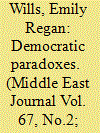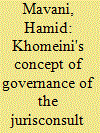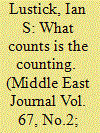| Srl | Item |
| 1 |
ID:
121474


|
|
|
|
|
| Publication |
2013.
|
| Summary/Abstract |
The 1999 decree by Kuwait's emir granting women electoral rights, and its subsequent parliamentary rejection, is more than just an instance of women's oppression in action. It also demonstrates a potential paradox between two axes of democratization: liberalization, the existence of a sphere of meaningful public contestation, and participation, that the right to participate in that sphere is extended to all. In Kuwait, 1999 represents an instance where those two axes were in direct competition. This article explores the 1999 enfranchisement as a way of understanding this democratic paradox and then follows these issues through the successful 2005 enfranchisement and the election of female Assembly members in 2007 and in the 2012, post-Arab Spring elections.
|
|
|
|
|
|
|
|
|
|
|
|
|
|
|
|
| 2 |
ID:
121476


|
|
|
|
|
| Publication |
2013.
|
| Summary/Abstract |
The serious crisis that has unfolded after the June 2009 presidential election in Iran exposed the absolutist nature of the state's highest religious authority, and the urgent need to critically interrogate Ayatollah Khomeini's concept of governance of the jurisconsult (wilayat al-faqih). Jurists and scholars have been attempting to devise a model in which sovereignty belongs to the public by basing their arguments on historical, jurisprudential, theological, philosophical, and extra-religious frameworks to present state models which allow for public sovereignty and challenge the notion of divine sovereignty inhering in the jurisconsult.
|
|
|
|
|
|
|
|
|
|
|
|
|
|
|
|
| 3 |
ID:
121477


|
|
|
|
|
| Publication |
2013.
|
| Summary/Abstract |
During the 1960s, Iran transitioned from a client state into an emerging partner of America. Crucial to the analysis of this transformation is understanding how Iran progressed from a low-priority military aid recipient in the 1950s to a military credit purchase partner in 1964. The transformation was characterized by frequent difficulties and disagreements as the Shah's demands and Washington's ability and/or desire to fulfill those demands rarely coalesced until the twilight of the Johnson Administration.
|
|
|
|
|
|
|
|
|
|
|
|
|
|
|
|
| 4 |
ID:
121479


|
|
|
|
|
| Publication |
2013.
|
| Summary/Abstract |
National security decision-making has been at the forefront of Israeli life for over six decades. Repeated wars, ongoing hostilities at lower levels, the need to confront dire and even existential threats, and various peace initiatives have all imbued Israel's national security decisions with unusual importance. Traditionally held to be primarily reactive in character, Israeli decision-making has become increasingly proactive in recent decades. At the same time, many of the diplomatic and military initiatives Israel has undertaken have gone awry, and the number of policy failures has become untenable. Indeed, Israel has suffered from a decades-long domestic political stalemate - arguably a crisis - on matters of its fundamental existence, including the Palestinian issue, with the political system unable to resolve the contending currents of opinion.
|
|
|
|
|
|
|
|
|
|
|
|
|
|
|
|
| 5 |
ID:
121478


|
|
|
|
|
| Publication |
2013.
|
| Summary/Abstract |
After decades of unprecedented national concern and diplomatic mobilization, popular and policy interest in Israel's continuing settlement in the territories occupied in June 1967 has all but disappeared. This inattention is not a consequence of an American policy triumph, but rather the opposite. Observers of all persuasions agree that during its first term, the administration of President Barack Obama was singularly unsuccessful in leading a diplomatic process between the antagonists. It stood by as Israel continued to marginalize the PLO and expand settlements in occupied territories, even as the PLO focused on building a new, and at times troubled, relationship with Islamist forces ruling the Gaza Strip. On Obama's watch, policymakers and the public alike have surrendered to the passions that drive the conflict. Seemingly unable to affect the course of the conflict, and drawn to the more hopeful and dramatic narratives of the Arab Spring, the American public and policymakers alike have become bored with the problem between Israelis and Palestinians.
|
|
|
|
|
|
|
|
|
|
|
|
|
|
|
|
| 6 |
ID:
121475


|
|
|
|
|
| Publication |
2013.
|
| Summary/Abstract |
Seven years ago, heightened anxieties in Israel about an Arab threat to Israel's Jewish majority triggered an influential campaign to change perceptions of who is winning the demographic battle. Proposals to annex 60% or more of the West Bank are based in part on its success in persuading many Israelis and others of the nonexistence of 1 to 1.5 million "missing" Palestinians. This campaign's estimates of Arab and Jewish population for 2004 and beyond are subjected to close scrutiny, revealing complex but systematic manipulation of data and exposing the political objectives and drastic distortions of the campaign.
|
|
|
|
|
|
|
|
|
|
|
|
|
|
|
|